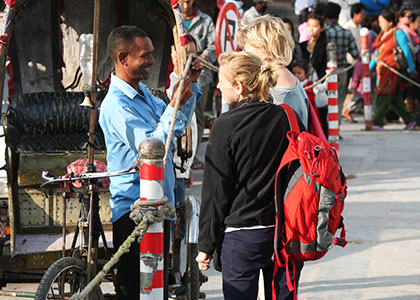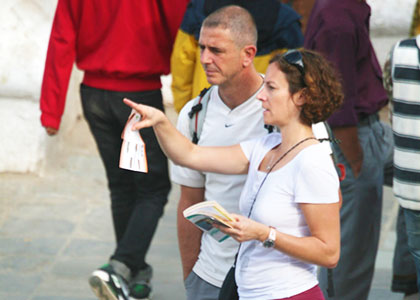10 Lessons on Indian Etiquette for Every Traveller
There has been a concept of mystic and exotic ideas embalmed with India for generations. Westerners recognise the country as a highly spiritual place, and a land that offers lots in terms of rituals and history.
|
|
|
1. Wear appropriate clothes (not too tight, not too loose)
India maintains a conservative approach towards its socio cultural aspects which might be a bit of a culture shock for the first time travellers. It is particularly important to dress appropriately in the rural areas. Common western attires is no more a new thing in the major cities however, if you are travelling to the temples or other religious sites, it is better to be dressed in traditional. Although it is not possible to be in the ethnic wear always had you been travelling all the while, make sure to cover your head as a sign of reverence. Understand that first impressions count!
2. Leave your shoes outside
Before getting in any residence, or any place that is not commercial, you should open your shoes as Indian etiquette. It is an absolute prerequisite for getting in a revered place like temple, mosques or Gurudwaras. In some places before entering a shop, you might also be asked to remove the shoes.
3. Try not to point fingers or feet at people, especially strangers
Feet are symbolised as less clean than the other body parts as per traditional Indian etiquette, therefore you should never point your legs or feet towards someone. Even by mistake, if you touch someone or any object by shoes, apologise. Indians generally touch their head or eyes as a gesture for apology. For elders, you are expected to show respect to elders by bending down and touching feet in India if you ever cross them with feet or misbehave unnecessarily.
One of the other signs of rudeness in India is pointing fingers towards others. Try using the whole hand or thumb when you have to show something or point someone.
|
|
|
4. Do not pass any object, especially food with left hand
The left hand is thought as unclean as per Indian etiquette. Generally, people are right handed, so when you have to pass on anything, particularly something edible, make sure to use the right hand as a courtesy. Many, while in hurry, might slip using the right hand. Apologise for any such thing as a courtesy.
5. Intrusive questions and Indians are common
For many, it might seem that these people are too interested or inclined in their personal lives, in reality, it is just their way of life to be asked and ask others about others. There is evidently a lack in maintaining privacy in India, and simultaneously there is a habit of placing people in the social hierarchy. There can be many who will ask you personal questions, even if you are meeting for the first time. In fact, some might find it rude if you do not ask them any question in return. Most people love to engage in the conversation.
No worries, you can always give a vague reply!
6. Being polite is good, but not necessary

Being Polite to Indian Locals
|
7. Don't completely refuse a request or an invitation
While it's essential to be self-confident and you should know where to say no in India, try to be as polite as possible while refusing any invitation or request immediately which can seem like a disrespectful gesture. In fact, you can even give the false expectation of commitment as hosts here love to see more guests coming in which is connected as a pious thing.
8. People may not be always on time
In the west, being late seems very offensive. In India, there is more elasticity for any timing time. While you should call or inform if lates, in India, you are mostly forgiven even when you are late for thirty minutes!
9. It is difficult to get respect for personal space
One of the downsides of overcrowding is lack of privacy. If you go to any crowded part of the city, the queues to the residential plots hardly share a considerable sense of distance. This can feel like getting on the nerves at first to see people jumping off the lines, and this is when you need to be stern if not rude to speak up for yourself.
10. No public display of affection
Holding hands in public is not a very rare sight but when in India, there is a limit. Kissing or hugging not always accepted very warm-heartedly in public spaces.
You May Like:
10 Tips to Avoid Culture Shock





